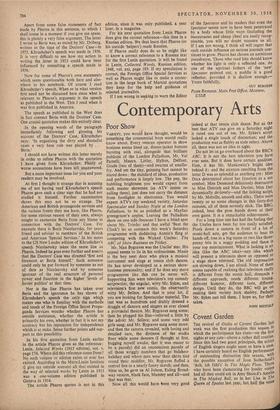Contemporary Arts
Poor Show
VARIETY, you would have thought, would be something the commercial boys would really know about. Every veteran operator in show business seems lined up, dinner-jacket buttons bursting with zeal, alongside that brilliant publicist of the London Palladium, Mr. Val Parnell; Messrs. Littler, Hylton, Delfont, Grade (two of them)—and swarms of smaller fry. And yet the tiny, grinning fact cannot be stared down : the standard of ideas, production and performance is limply low. The pep, the bubbling brightness you would expect from such master showmen (as ATV insists on calling them), just does not carry the distance from footlights to electronics. You would expect ATV's top weekend variety, Saturday Spectacular and Sunday Night at the London Palladium, to be as polished as a Mayfair greengrocer's apples. Leaving the Palladium show on one side (because I have a blind spot about Mr. Trinder and that awful 'Beat the Clock') let us compare this week's Saturday programme with doddering Auntie's fling at competing with the Wicked Uncles: The ABC of Show Business on Friday.
Mr. Max Bygraves was the Uncles' star. His appeal seems to lie in his ordinariness. Maxie is the boy next door who plays a musical instrument and sings at tennis club dances. He has never developed as a serious show- business personality; and if he does any more programmes like this one he never will. Supporting him were television's top comedy scriptwriter, the angular, witty Mr. Sykes, and television's first new comic, the observantly witty Mr. Sellers. And that is your lot, if you are looking for Spectacular material. The rest was as humdrum and drably dressed a draggle of dancers and singers as ever closed a provincial theatre. Mr. Bygraves sang some; then he plugged his film—relieved a little by the adroit Mr. Sellers; and some very odd girls sang; and Mr. Bygraves sang some more; and then the camera revealed, with loving and detailed care, the dirtiness of the studio floor while some dancers (I thought at first, hugging myself awake, that it was meant to be a parody) did an unconscious parody of all those wriggly numbers that go balahoo- balahay and where men wear their shirts tied round their middles; Mr. Bygraves fluffed a central line in a nearly funny sketch; and then, bless us, he gave us Al Jolson, Ealing Broad- way version, black face, Mammy and all—and that was that.
Now all this would have been very good indeed at that tennis club dance. But as the best that ATV can give on a Saturday night it rated one out of ten. Mr. Sykes's script lacked a single touch of distinction; and the production was as flabby as stale celery. Above all, there was not an idea in sight.
Do not let us go overboard about the BBC's ABC. It is not the best television you have ever seen. But it does have certain qualities. First, it has Mr. Mankowitz's bright idea behind it: and the mixture resulting from the letter D was as splendid as anything yet: Miss Dors determined about her function, as a sex symbol; Miss Desmond deliciously destructive to Miss Dietrich and Miss Davies; Miss Day dynamically de-lovely—and the linking script, by Mr. Melville, smooth and silky. There were twenty or so scene changes in this forty-five minutes, all of them serenely slick. The BBC, indeed, beat the pros hands down at their own game. It is a remarkable achievement. For a long time one has had the feeling that the Uncles have been far too easily satisfied. Plonk down a camera in front of a lot of music-hall acts, get the audience to beat its hands off, toss in a big name or two like three- penny bits in a soggy pudding and there is your top entertainment. What is lacking is an idea (like the ABC idea)—any idea which will present a television show as opposed to a stage show televised. The old impresarios are slowing down, I am afraid. None of them seems capable of realising that television really is different from the music hall, demands a different approach, needs different timing, different humour, different taste, different design. Until they do, the BBC will go on making their variety look shabby. Perhaps Mr. Sykes can tell them. I hope so, for their sakes.
JOHN METCAll


















































 Previous page
Previous page